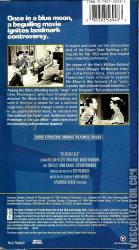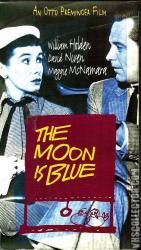The Moon is Blue
Catalog Number
35694
-
Primary Distributor (If not listed, select "OTHER")
Catalog Number
35694
Primary Distributor (If not listed, select "OTHER")
Release Year
Country
N/A (NTSC)
N/A | N/A | N/A
N/A | N/A
The Moon is Blue (1953)
Additional Information
Additional Information
Sensationally Funny -- Recommended for Adults.
The PIcture Everyone is Talking About!
From the Sensational Stage Hit That Ran 3 years on Broadway!
This is the story of a chaste young TV-commercial actress (Maggie McNamara) who is romanced by a playboy architect (William Holden). Despite all sorts of temptations, the girl refuses the architect's invitation to become his mistress, holding out for marriage or nothing. Meanwhile, middle-aged rake David Niven tries to move in on the girl himself, with an equal lack of success. So why was this harmless little comedy so controversial? It seems that director Otto Preminger decided to film the play as written, retaining such words as "virgin," "seduce," and "mistress" in the script. The antediluvian Motion Picture Production Code refused to approve the film so long as those naughty words remained in the dialogue; thus, Preminger released the picture minus the Code's seal of approval. Rather than hurt the film's chances at the box office, Preminger's bold move resulted in a major financial success -- not to mention the beginning of the end for the ancient, wheezy Production Code. However, in the meantime, troubles piled up; the Jersey City Municipal Court -- at the hands of Secaucus' Justice George King -- fined Alfred Manfredonia, manager of the Stanley Theatre, 100 dollars for screening the film (declaring him guilty of violating a city ordinance), and a ban was imposed on the picture by the Maryland State Board of Motion Picture Censors. While The New York Times' Bosley Crowther dismissed the accusations of prurience, he blithely observed, "The Moon Is Blue is not outstanding, either as a romance or as a film...at times, it gets awfully tedious...Its charm...will depend on how much one delights in its choice of words.
Bosley Crowther of the New York Times observed it "is not outstanding, either as a romance or as film. The wit of Mr. Herbert . . . is turned almost wholly on his freeness with the startling idea or phrase, as glibly tossed off (for the most part) by a young lady who appears a wide-eyed child. And Otto Preminger's lifting of the play from the stage to the screen is much too rigidly respectful of its conversational form. As a consequence, the movement is restricted and the talk is exceedingly long. At times, it gets awfully tedious, considering its limited range."[14]
TIME Magazine found the film to be pleasant.[15]
The Catholic Legion of Decency gave the movie a "C", "Condemned" rating, despite giving the original play a milder "B", "Unobjectionable for adults" rating.[16]
In his review of the DVD release of the film, Tim Purtell of Entertainment Weekly called the film a "trifle" that "seems overly talky and slight"
David Niven won the Golden Globe Award for Best Actor – Motion Picture Musical or Comedy.
Maggie McNamara was nominated for the Academy Award for Best Actress but lost to Audrey Hepburn in Roman Holiday. Otto Ludwig was nominated for the Academy Award for Best Film Editing but lost to William A. Lyon for From Here to Eternity. Herschel Burke Gilbert and Sylvia Fine were nominated for the Academy Award for Best Song for the title tune but lost to Sammy Fain and Paul Francis Webster for "Secret Love" from Calamity Jane.
F. Hugh Herbert was nominated for the Writers Guild of America Award for Best Written Comedy but lost to Ian McLellan Hunter, Dalton Trumbo, and John Dighton for Roman Holiday
Release Date: July 8, 1953
Distrib: Warner Brothers
The PIcture Everyone is Talking About!
From the Sensational Stage Hit That Ran 3 years on Broadway!
This is the story of a chaste young TV-commercial actress (Maggie McNamara) who is romanced by a playboy architect (William Holden). Despite all sorts of temptations, the girl refuses the architect's invitation to become his mistress, holding out for marriage or nothing. Meanwhile, middle-aged rake David Niven tries to move in on the girl himself, with an equal lack of success. So why was this harmless little comedy so controversial? It seems that director Otto Preminger decided to film the play as written, retaining such words as "virgin," "seduce," and "mistress" in the script. The antediluvian Motion Picture Production Code refused to approve the film so long as those naughty words remained in the dialogue; thus, Preminger released the picture minus the Code's seal of approval. Rather than hurt the film's chances at the box office, Preminger's bold move resulted in a major financial success -- not to mention the beginning of the end for the ancient, wheezy Production Code. However, in the meantime, troubles piled up; the Jersey City Municipal Court -- at the hands of Secaucus' Justice George King -- fined Alfred Manfredonia, manager of the Stanley Theatre, 100 dollars for screening the film (declaring him guilty of violating a city ordinance), and a ban was imposed on the picture by the Maryland State Board of Motion Picture Censors. While The New York Times' Bosley Crowther dismissed the accusations of prurience, he blithely observed, "The Moon Is Blue is not outstanding, either as a romance or as a film...at times, it gets awfully tedious...Its charm...will depend on how much one delights in its choice of words.
Bosley Crowther of the New York Times observed it "is not outstanding, either as a romance or as film. The wit of Mr. Herbert . . . is turned almost wholly on his freeness with the startling idea or phrase, as glibly tossed off (for the most part) by a young lady who appears a wide-eyed child. And Otto Preminger's lifting of the play from the stage to the screen is much too rigidly respectful of its conversational form. As a consequence, the movement is restricted and the talk is exceedingly long. At times, it gets awfully tedious, considering its limited range."[14]
TIME Magazine found the film to be pleasant.[15]
The Catholic Legion of Decency gave the movie a "C", "Condemned" rating, despite giving the original play a milder "B", "Unobjectionable for adults" rating.[16]
In his review of the DVD release of the film, Tim Purtell of Entertainment Weekly called the film a "trifle" that "seems overly talky and slight"
David Niven won the Golden Globe Award for Best Actor – Motion Picture Musical or Comedy.
Maggie McNamara was nominated for the Academy Award for Best Actress but lost to Audrey Hepburn in Roman Holiday. Otto Ludwig was nominated for the Academy Award for Best Film Editing but lost to William A. Lyon for From Here to Eternity. Herschel Burke Gilbert and Sylvia Fine were nominated for the Academy Award for Best Song for the title tune but lost to Sammy Fain and Paul Francis Webster for "Secret Love" from Calamity Jane.
F. Hugh Herbert was nominated for the Writers Guild of America Award for Best Written Comedy but lost to Ian McLellan Hunter, Dalton Trumbo, and John Dighton for Roman Holiday
Release Date: July 8, 1953
Distrib: Warner Brothers






Comments0
Login / Register to post comments